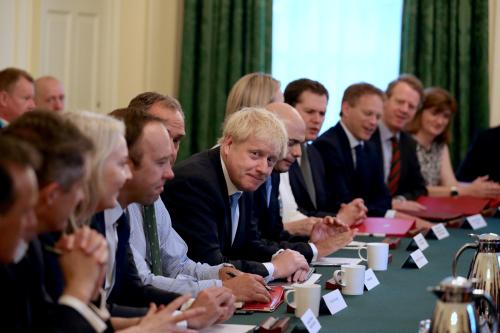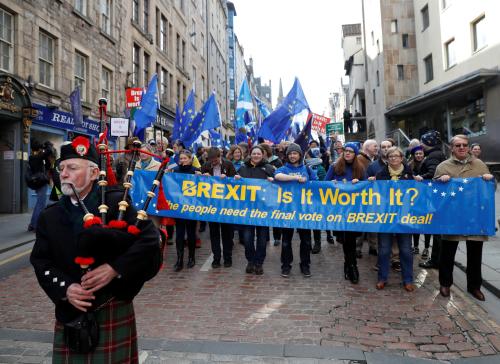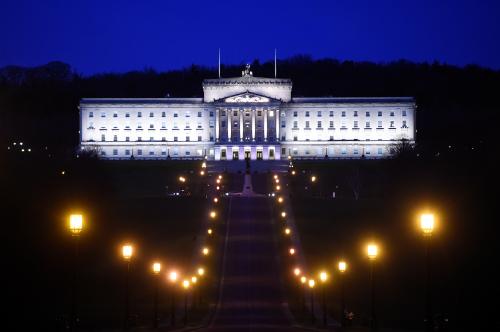Risks to political stability in Northern Ireland are on the rise as U.K. Prime Minister Boris Johnson pushes to leave the European Union on October 31, with or without a withdrawal agreement with Brussels. The Trump administration must put peace before trade, argues Amanda Sloat. This article originally appeared in The Washington Post.
Since taking office on July 24, British Prime Minister Boris Johnson has outlined a significantly harder stance on Brexit than his predecessor, Theresa May. He has made clear that Britain is leaving the European Union on Oct. 31, with or without a deal. He is refusing to negotiate with E.U. leaders unless they reopen the withdrawal agreement and remove the Northern Ireland backstop, which are long-standing E.U. red lines. He also announced more than 2 billion pounds to fund no-deal contingency plans, including stockpiling medicine and hiring more border officers.
As Johnson and his “war cabinet” of hard-line Brexiteers push forward with their demands, the risks to Northern Ireland are increasing. But instead of seeking to stabilize the peace process, President Trump has encouraged Britain to abandon divorce talks with the E.U. in favor of a trade deal with the United States — a position that could have potentially disastrous consequences.
Northern Ireland remains the biggest hurdle to Brexit. Britain is part of the E.U.’s customs union and single market. It will leave both after Brexit, elevating the border with Ireland to a customs border with associated controls. This will create practical challenges and devastate many who endured decades of sectarian violence. The 1998 Good Friday Agreement, which addressed security and governance concerns of nationalist and unionist communities and took steps to mitigate identity politics, removed checkpoints along the border.
The British government has argued that it can avoid border infrastructure by developing technical alternatives or negotiating a post-Brexit economic agreement with the E.U. Unless and until either occurs, European leaders insist on an insurance policy: Britain must remain in a customs union with the E.U., and Northern Ireland must comply with single-market regulations on goods. Johnson views the backstop as “anti-democratic,” as it does not allow unilateral British withdrawal, hampers the negotiation of trade deals and was not endorsed by Parliament.
The E.U. has been clear that a no-deal Brexit would result in a hard border between Ireland and Northern Ireland, though the British and Irish governments have pledged not to impose controls. Yet both countries have incentives to find a solution. In order for London to negotiate a post-Brexit trade deal with the E.U., Brussels has insisted it must first accept measures that keep the border open and protect the E.U. single market. In order for Dublin to maintain trade with the rest of the E.U., it must comply with regulations governing its border with a nonmember.
All of Northern Ireland’s political party leaders stressed the dire consequences of a no-deal Brexit during Johnson’s visit to Belfast this week. There are economic risks, including the projected loss of 40,000 jobs and an estimated decline in exports to Ireland of 11 percent to 19 percent. There are security risks, with police chiefs long warning about unrest and attacks on customs posts. There are also political risks, with Irish Prime Minister Leo Varadkar cautioning that a hard border could heighten calls for Irish reunification.
The lack of governance in Northern Ireland creates further complications. The power-sharing executive, a key component of the Good Friday Agreement, collapsed in January 2017 after disagreements between the Democratic Unionist Party (DUP) and nationalist Sinn Féin over mismanagement of a green-energy program. Repeated attempts to restore the government have failed. Absent democratic oversight, civil servants are reluctant to make decisions. Given the complexity of a no-deal Brexit, Britain’s top civil servant has recommended imposing direct rule. London reclaimed decision-making authority from Belfast at various points during the first decade after the agreement. Yet suspending the devolved government now would be contentious, particularly for the nationalist community, as Johnson’s reliance on the DUP’s 10 legislators for a one-seat parliamentary majority in Westminster would privilege the unionist position.
Although the United States has long supported the Northern Ireland peace process, the Trump administration has been notably absent. Instead, the president has called Brexit a “great thing,” warned that the current divorce settlement would threaten British trade with the United States, and promised Johnson a “very substantial” deal once his country leaves the European Union. Both leaders are ignoring Brexit’s inconvenient truth: If Britain deviates from E.U. economic rules, there will be more freedom to negotiate new trade agreements, yet greater need for intrusive checks along the Irish border.
Congressional leaders and prominent Irish-Americans are filling the silence. House Speaker Nancy Pelosi (D-Calif.) first raised the alarm in April when she toured London, Dublin and Belfast to warn that Congress would not support a trade agreement that damaged the peace process. Rep. Richard E. Neal (D-Mass.), chairman of the House Ways and Means Committee that could block a trade deal, and Rep. Peter King (R-N.Y.), co-chairs of the Friends of Ireland caucus, reiterated similar pledges this week. A group of 40 Irish-American leaders raised related concerns in a letter to the new British government.
As Britain races toward the Brexit cliff, the Trump administration must join other worried Americans in putting peace before trade.






Commentary
How Boris Johnson and President Trump risk destabilizing Northern Ireland
August 5, 2019